
“Our solar system’s formation was a lot messier than you think”
***
This is a longish piece, I’m afraid, but it’s really quite interesting:
***
Some commenters on my blog like to point out the great contributions of science to human knowledge and well-being. By contrast, they say, theology has made little or no progress over many generations. But, in fact, what would “progress” in theology actually be?
In that light, I like a cheeky comment from Rev. Dr. John Polkinghorne, a rather prolific author and an Anglican priest, as well as the former president of Queens College, Cambridge:
“If the physicists seem to achieve their ends more successfully than the theologians,” he says, “that is simply a reflection of how much easier science is than theology.”
Clerical anti-intellectualism, you might say. Anti-scientific religious obscurantism. An obvious example of the warfare of religion against science.
Well, no. Not very likely.
The Rev. Dr. Polkinghorne is no enemy to science.
Before he was ordained an Anglican priest relatively late in life, Sir John Polkinghorne was an internationally respected theoretical physicist. For quite some time, he was Professor of Mathematical Physics in the University of Cambridge. He is a Knight Commander of the Most Excellent Order of the British Empire and a Fellow of the Royal Society, the world’s oldest independent scientific institution — more formally known as the Royal Society of London for Improving Natural Knowledge. (Its membership has included such notable scientists and thinkers as John Dalton, Stephen Hawking, Isaac Newton, Robert Boyle, Christopher Wren, Charles Darwin, Francis Crick, Joseph Priestley, Ernest Rutherford, Lord Kelvin, Michael Faraday, and Alexander Fleming.)
“If we are seeking to serve the God of truth,” Sir John has written, “then we should really welcome truth from whatever source it comes. We shouldn’t fear the truth. Some of it will be from science, obviously, but by no means all of it. It will sometimes be perplexing, how this bit of truth relates to that bit of truth; we know that within science itself often enough and we find it outside of science as well. The crucial thing is to be honest.”












